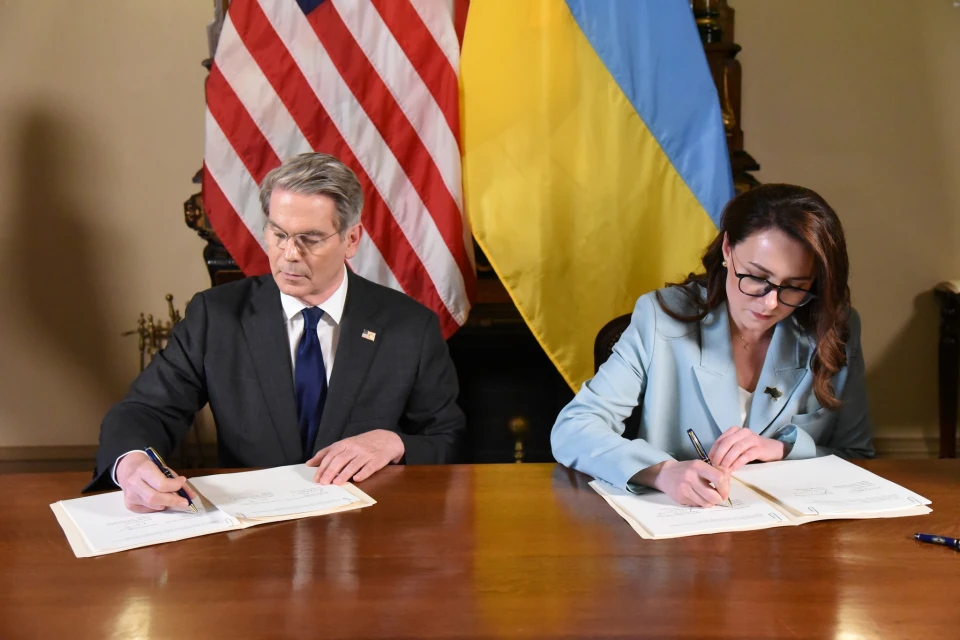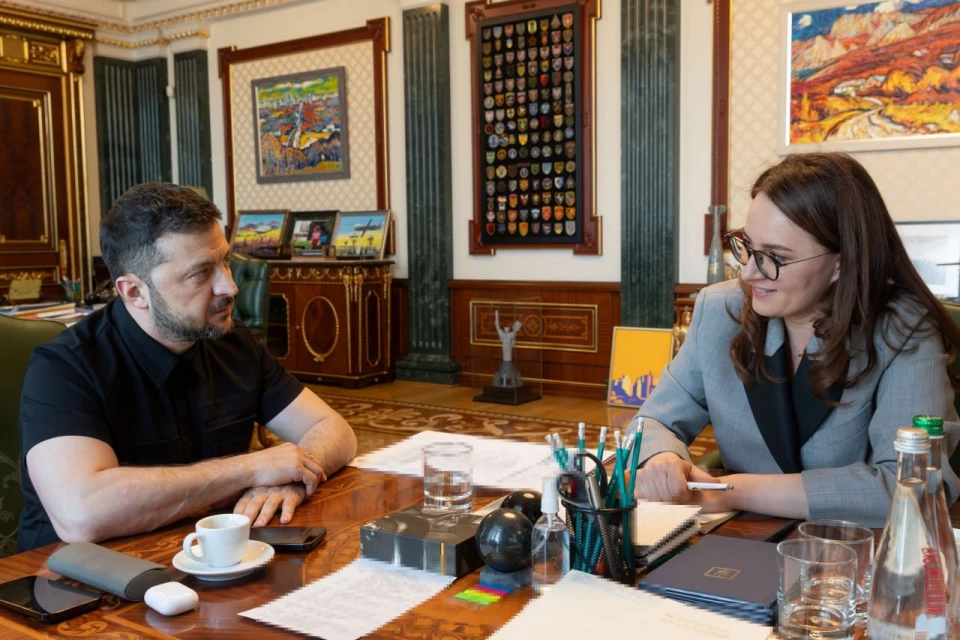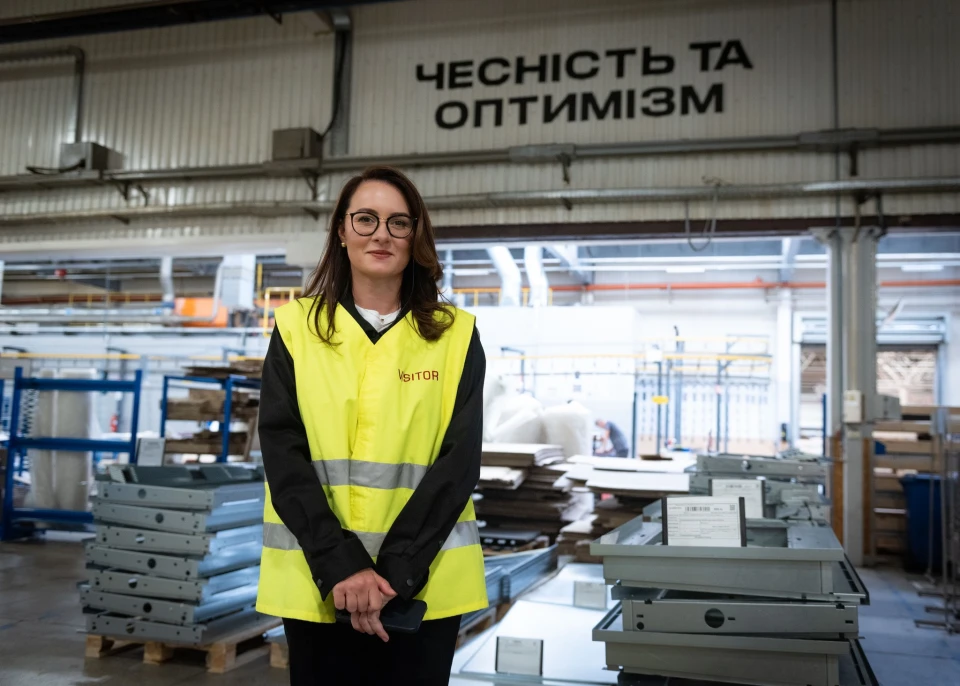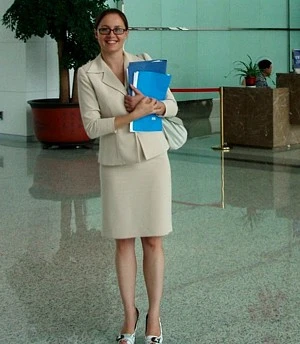Who is Yulia Svyrydenko, Ukraine’s new Prime Minister?
global.espreso.tv
Thu, 17 Jul 2025 14:54:00 +0300

A year passed between the first rumors that First Deputy Prime Minister Yulia Svyrydenko would replace Denys Shmyhal and her official appointment as prime minister. Yet during that time, she effectively played the lead role in government. Svyrydenko represented Ukraine at nearly all major international meetings and negotiations, including talks on the rare earth agreement with the United States following the well-known Oval Office dispute. Ultimately, it was Svyrydenko who signed the agreement. On July 14, President Volodymyr Zelenskyy announced that he had offered Deputy Prime Minister Yulia Svyrydenko to head the government.“I am grateful to President Volodymyr Zelenskyy for his trust — and for the opportunity to serve Ukraine at this crucial time,” she wrote after meeting with Zelenskyy, describing the tasks the president had set for her."The decision to appoint the Prime Minister of Ukraine is made by the Verkhovna Rada. We are preparing to interact with the parliament and present the relevant governmental steps. I will announce proposals for government members shortly," she added, making it clear that the President's Office had already made the decision and that the vote in the Rada was just a formality.On July 17, the Verkhovna Rada supported her appointment.
On July 14, President Volodymyr Zelenskyy announced that he had offered Deputy Prime Minister Yulia Svyrydenko to head the government.“I am grateful to President Volodymyr Zelenskyy for his trust — and for the opportunity to serve Ukraine at this crucial time,” she wrote after meeting with Zelenskyy, describing the tasks the president had set for her."The decision to appoint the Prime Minister of Ukraine is made by the Verkhovna Rada. We are preparing to interact with the parliament and present the relevant governmental steps. I will announce proposals for government members shortly," she added, making it clear that the President's Office had already made the decision and that the vote in the Rada was just a formality.On July 17, the Verkhovna Rada supported her appointment. It’s worth recalling that Yulia Svyrydenko entered the Cabinet from the President’s Office. She joined the government in 2019 as Deputy Minister of Economic Development, Trade, and Agriculture, when Tymofiy Mylovanov headed the ministry.In July 2020, she became First Deputy Minister, and by December, she moved to the President’s Office as Deputy Head under Andriy Yermak, serving for almost a year.On November 4, 2021, Svyrydenko was appointed First Deputy Prime Minister and Minister of Economy.
It’s worth recalling that Yulia Svyrydenko entered the Cabinet from the President’s Office. She joined the government in 2019 as Deputy Minister of Economic Development, Trade, and Agriculture, when Tymofiy Mylovanov headed the ministry.In July 2020, she became First Deputy Minister, and by December, she moved to the President’s Office as Deputy Head under Andriy Yermak, serving for almost a year.On November 4, 2021, Svyrydenko was appointed First Deputy Prime Minister and Minister of Economy. Yulia Svyrydenko's family. BackgroundAt 39, Yuliia Svyrydenko has business experience but chose a career in public service — a path influenced by her late father, Anatolii Svyrydenko, who headed the Chernihiv branch of the Antimonopoly Committee for many years. She holds a master’s degree in antimonopoly management from Kyiv National University of Trade and Economics.Her uncle, Valerii Svyrydenko, works as an expert at the National Security and Defense Council, while her brother, Vitalii Svyrydenko, is a businessman and former Chernihiv Regional Council member from Servant of the People (2020–2023).Svyrydenko was previously married to Chernihiv entrepreneur Serhii Derlemenko; they divorced in 2022. In her 2023 asset declaration, she listed only her daughter, Sofiia, as a family member.Worked in China for three yearsAccording to Chernihiv outlet Vysokyi Val, after graduating in 2008, Yuliia Svyrydenko held positions at several local companies, including AMP (a Ukrainian-Andorran JV), the Chernihiv Bureau of Technical Inventory, Chernihiv Law Division, Demark Bank, and ChernihiVTorg LLC.In 2011, she moved to China, where she led Chernihiv’s Permanent Mission in the People’s Republic of China for three years, promoting the region’s natural, economic, and investment potential.After returning to Ukraine, she became deputy director of Ekovtor LLC, a company producing polyester fiber from recycled plastic. From there, she entered public service: in 2015, she became an advisor to Chernihiv Regional State Administration head Valerii Kulich, who later appointed her director of the Department of Economic Development, and eventually his first deputy.
Yulia Svyrydenko's family. BackgroundAt 39, Yuliia Svyrydenko has business experience but chose a career in public service — a path influenced by her late father, Anatolii Svyrydenko, who headed the Chernihiv branch of the Antimonopoly Committee for many years. She holds a master’s degree in antimonopoly management from Kyiv National University of Trade and Economics.Her uncle, Valerii Svyrydenko, works as an expert at the National Security and Defense Council, while her brother, Vitalii Svyrydenko, is a businessman and former Chernihiv Regional Council member from Servant of the People (2020–2023).Svyrydenko was previously married to Chernihiv entrepreneur Serhii Derlemenko; they divorced in 2022. In her 2023 asset declaration, she listed only her daughter, Sofiia, as a family member.Worked in China for three yearsAccording to Chernihiv outlet Vysokyi Val, after graduating in 2008, Yuliia Svyrydenko held positions at several local companies, including AMP (a Ukrainian-Andorran JV), the Chernihiv Bureau of Technical Inventory, Chernihiv Law Division, Demark Bank, and ChernihiVTorg LLC.In 2011, she moved to China, where she led Chernihiv’s Permanent Mission in the People’s Republic of China for three years, promoting the region’s natural, economic, and investment potential.After returning to Ukraine, she became deputy director of Ekovtor LLC, a company producing polyester fiber from recycled plastic. From there, she entered public service: in 2015, she became an advisor to Chernihiv Regional State Administration head Valerii Kulich, who later appointed her director of the Department of Economic Development, and eventually his first deputy. What Svyrydenko’s former subordinates say about herYulia Svyrydenko became head of the Department of Economic Development at just 29, quickly transforming the institution."She came from a respectable family — her father held a position, and her mother was part of the regional council. Naturally, their connections helped her secure the job, but she was always determined to prove her own worth. Some said she was a flawless executor but lacked initiative; to us, however, she seemed too proactive at times," a former colleague from the Chernihiv Regional State Administration told Espreso.“I was her deputy, and I can only speak positively about her leadership skills,” said Svitlana Poltoratska, deputy director of the Economic Development Department at the Chernihiv Regional State Administration. "Our team grew significantly under her guidance. She is constantly striving to improve herself and encourages her team to do the same. Thanks to her leadership, I had the chance to learn and participate in new projects. She is truly an innovator and a fascinating person. This is not mere flattery—she has no limits and embraces challenges. With a strong team, she can tackle any task."Svitlana Poltoratska describes the minister as an excellent team leader.“She is completely conflict-free, tolerant, and knows how to find a middle ground. Although she assigned challenging tasks, working with her was comfortable. She listened and truly heard, which is essential for any manager,” Poltoratska said.After the resignation of Chernihiv Regional State Administration head Valerii Kulich, Yulia Svyrydenko served as acting head for several months. During that period, one of the region’s major emergencies occurred—the explosions at military warehouses in Ichnia. Kulich, who had brought her into the administration, praised her handling of the crisis. Her ability to manage emergencies later proved valuable in government. However, despite her strong desire, she was never officially appointed head of the administration. In 2018, she left the administration and joined Sidko Ukraine, a company specializing in grain trading and animal feed production. The company’s co-owners include former administration head Kulich and Iryna Atroshchenko, wife of former MP and then-mayor of Chernihiv, Vitalii Atroshchenko. This underscores Svyrydenko’s strong connections with the region’s top officials.“The business had high hopes specifically for Svyrydenko”Yuliia Drohovoz, Vice President of the Ukrainian Union of Industrialists and Entrepreneurs and head of its Economic Policy Commission, told Espreso that business had high expectations for Svyrydenko when she became First Deputy Prime Minister.“At one time, business placed many hopes specifically on Yuliia Svyrydenko. She speaks well and says the right things, but what comes next? She was already the First Deputy Prime Minister — the second most important person in the Cabinet. Since the government is effectively run by the President’s Office, her becoming the top official won’t make much difference,” Drohovoz said.She added that expecting significant economic changes from a single minister is difficult when, in reality, the economy is primarily controlled by the Ministry of Finance, the National Bank, and the President’s Office.“We understand that the war is placing enormous strain on the economy, creating conditions unsuitable for business development or economic recovery. The issue isn’t just the minister’s personality, but the government’s overall policy. Essentially, the economy is controlled by the Ministry of Finance and the National Bank. When the Finance Ministry says, ‘We don’t have enough money,’ everyone immediately shifts focus away from the economy to how to raise funds, as is happening now,” Yuliia Drohovoz explained.“We face a problem because there are no independent government officials who carry out their duties based on their own authority and responsibilities. It’s crucial that the minister or prime minister be more than just a nominal figure — someone independent, principled, and with a clear vision who prioritizes the country’s interests without interference. Especially from the President’s Office, which not only influences the government but actively interferes in its work.”In contrast, Yaroslav Zhalilo, Deputy Director of the National Institute for Strategic Studies, believes that the Ministry of Economy under Yulia Svyrydenko’s leadership is working quite effectively.“I don’t comment on individuals. But I can say that, despite the war, the Ministry of Economy is handling its core tasks. Given the urgent, crisis-like challenges it constantly faces, I believe they are working effectively,” Yaroslav Zhalilo told Espreso. “It’s difficult to expect strategic decisions from the Ministry of Economy during wartime. I know how much it is focused on emergency operations. Strategic planning requires greater coordination between agencies. That’s why consolidating efforts among the Ministry of Economy, Ministry of Energy, Ministry of Infrastructure, and Ministry of Social Policy is crucial now.”
What Svyrydenko’s former subordinates say about herYulia Svyrydenko became head of the Department of Economic Development at just 29, quickly transforming the institution."She came from a respectable family — her father held a position, and her mother was part of the regional council. Naturally, their connections helped her secure the job, but she was always determined to prove her own worth. Some said she was a flawless executor but lacked initiative; to us, however, she seemed too proactive at times," a former colleague from the Chernihiv Regional State Administration told Espreso.“I was her deputy, and I can only speak positively about her leadership skills,” said Svitlana Poltoratska, deputy director of the Economic Development Department at the Chernihiv Regional State Administration. "Our team grew significantly under her guidance. She is constantly striving to improve herself and encourages her team to do the same. Thanks to her leadership, I had the chance to learn and participate in new projects. She is truly an innovator and a fascinating person. This is not mere flattery—she has no limits and embraces challenges. With a strong team, she can tackle any task."Svitlana Poltoratska describes the minister as an excellent team leader.“She is completely conflict-free, tolerant, and knows how to find a middle ground. Although she assigned challenging tasks, working with her was comfortable. She listened and truly heard, which is essential for any manager,” Poltoratska said.After the resignation of Chernihiv Regional State Administration head Valerii Kulich, Yulia Svyrydenko served as acting head for several months. During that period, one of the region’s major emergencies occurred—the explosions at military warehouses in Ichnia. Kulich, who had brought her into the administration, praised her handling of the crisis. Her ability to manage emergencies later proved valuable in government. However, despite her strong desire, she was never officially appointed head of the administration. In 2018, she left the administration and joined Sidko Ukraine, a company specializing in grain trading and animal feed production. The company’s co-owners include former administration head Kulich and Iryna Atroshchenko, wife of former MP and then-mayor of Chernihiv, Vitalii Atroshchenko. This underscores Svyrydenko’s strong connections with the region’s top officials.“The business had high hopes specifically for Svyrydenko”Yuliia Drohovoz, Vice President of the Ukrainian Union of Industrialists and Entrepreneurs and head of its Economic Policy Commission, told Espreso that business had high expectations for Svyrydenko when she became First Deputy Prime Minister.“At one time, business placed many hopes specifically on Yuliia Svyrydenko. She speaks well and says the right things, but what comes next? She was already the First Deputy Prime Minister — the second most important person in the Cabinet. Since the government is effectively run by the President’s Office, her becoming the top official won’t make much difference,” Drohovoz said.She added that expecting significant economic changes from a single minister is difficult when, in reality, the economy is primarily controlled by the Ministry of Finance, the National Bank, and the President’s Office.“We understand that the war is placing enormous strain on the economy, creating conditions unsuitable for business development or economic recovery. The issue isn’t just the minister’s personality, but the government’s overall policy. Essentially, the economy is controlled by the Ministry of Finance and the National Bank. When the Finance Ministry says, ‘We don’t have enough money,’ everyone immediately shifts focus away from the economy to how to raise funds, as is happening now,” Yuliia Drohovoz explained.“We face a problem because there are no independent government officials who carry out their duties based on their own authority and responsibilities. It’s crucial that the minister or prime minister be more than just a nominal figure — someone independent, principled, and with a clear vision who prioritizes the country’s interests without interference. Especially from the President’s Office, which not only influences the government but actively interferes in its work.”In contrast, Yaroslav Zhalilo, Deputy Director of the National Institute for Strategic Studies, believes that the Ministry of Economy under Yulia Svyrydenko’s leadership is working quite effectively.“I don’t comment on individuals. But I can say that, despite the war, the Ministry of Economy is handling its core tasks. Given the urgent, crisis-like challenges it constantly faces, I believe they are working effectively,” Yaroslav Zhalilo told Espreso. “It’s difficult to expect strategic decisions from the Ministry of Economy during wartime. I know how much it is focused on emergency operations. Strategic planning requires greater coordination between agencies. That’s why consolidating efforts among the Ministry of Economy, Ministry of Energy, Ministry of Infrastructure, and Ministry of Social Policy is crucial now.”
 On July 14, President Volodymyr Zelenskyy announced that he had offered Deputy Prime Minister Yulia Svyrydenko to head the government.“I am grateful to President Volodymyr Zelenskyy for his trust — and for the opportunity to serve Ukraine at this crucial time,” she wrote after meeting with Zelenskyy, describing the tasks the president had set for her."The decision to appoint the Prime Minister of Ukraine is made by the Verkhovna Rada. We are preparing to interact with the parliament and present the relevant governmental steps. I will announce proposals for government members shortly," she added, making it clear that the President's Office had already made the decision and that the vote in the Rada was just a formality.On July 17, the Verkhovna Rada supported her appointment.
On July 14, President Volodymyr Zelenskyy announced that he had offered Deputy Prime Minister Yulia Svyrydenko to head the government.“I am grateful to President Volodymyr Zelenskyy for his trust — and for the opportunity to serve Ukraine at this crucial time,” she wrote after meeting with Zelenskyy, describing the tasks the president had set for her."The decision to appoint the Prime Minister of Ukraine is made by the Verkhovna Rada. We are preparing to interact with the parliament and present the relevant governmental steps. I will announce proposals for government members shortly," she added, making it clear that the President's Office had already made the decision and that the vote in the Rada was just a formality.On July 17, the Verkhovna Rada supported her appointment. It’s worth recalling that Yulia Svyrydenko entered the Cabinet from the President’s Office. She joined the government in 2019 as Deputy Minister of Economic Development, Trade, and Agriculture, when Tymofiy Mylovanov headed the ministry.In July 2020, she became First Deputy Minister, and by December, she moved to the President’s Office as Deputy Head under Andriy Yermak, serving for almost a year.On November 4, 2021, Svyrydenko was appointed First Deputy Prime Minister and Minister of Economy.
It’s worth recalling that Yulia Svyrydenko entered the Cabinet from the President’s Office. She joined the government in 2019 as Deputy Minister of Economic Development, Trade, and Agriculture, when Tymofiy Mylovanov headed the ministry.In July 2020, she became First Deputy Minister, and by December, she moved to the President’s Office as Deputy Head under Andriy Yermak, serving for almost a year.On November 4, 2021, Svyrydenko was appointed First Deputy Prime Minister and Minister of Economy. Yulia Svyrydenko's family. BackgroundAt 39, Yuliia Svyrydenko has business experience but chose a career in public service — a path influenced by her late father, Anatolii Svyrydenko, who headed the Chernihiv branch of the Antimonopoly Committee for many years. She holds a master’s degree in antimonopoly management from Kyiv National University of Trade and Economics.Her uncle, Valerii Svyrydenko, works as an expert at the National Security and Defense Council, while her brother, Vitalii Svyrydenko, is a businessman and former Chernihiv Regional Council member from Servant of the People (2020–2023).Svyrydenko was previously married to Chernihiv entrepreneur Serhii Derlemenko; they divorced in 2022. In her 2023 asset declaration, she listed only her daughter, Sofiia, as a family member.Worked in China for three yearsAccording to Chernihiv outlet Vysokyi Val, after graduating in 2008, Yuliia Svyrydenko held positions at several local companies, including AMP (a Ukrainian-Andorran JV), the Chernihiv Bureau of Technical Inventory, Chernihiv Law Division, Demark Bank, and ChernihiVTorg LLC.In 2011, she moved to China, where she led Chernihiv’s Permanent Mission in the People’s Republic of China for three years, promoting the region’s natural, economic, and investment potential.After returning to Ukraine, she became deputy director of Ekovtor LLC, a company producing polyester fiber from recycled plastic. From there, she entered public service: in 2015, she became an advisor to Chernihiv Regional State Administration head Valerii Kulich, who later appointed her director of the Department of Economic Development, and eventually his first deputy.
Yulia Svyrydenko's family. BackgroundAt 39, Yuliia Svyrydenko has business experience but chose a career in public service — a path influenced by her late father, Anatolii Svyrydenko, who headed the Chernihiv branch of the Antimonopoly Committee for many years. She holds a master’s degree in antimonopoly management from Kyiv National University of Trade and Economics.Her uncle, Valerii Svyrydenko, works as an expert at the National Security and Defense Council, while her brother, Vitalii Svyrydenko, is a businessman and former Chernihiv Regional Council member from Servant of the People (2020–2023).Svyrydenko was previously married to Chernihiv entrepreneur Serhii Derlemenko; they divorced in 2022. In her 2023 asset declaration, she listed only her daughter, Sofiia, as a family member.Worked in China for three yearsAccording to Chernihiv outlet Vysokyi Val, after graduating in 2008, Yuliia Svyrydenko held positions at several local companies, including AMP (a Ukrainian-Andorran JV), the Chernihiv Bureau of Technical Inventory, Chernihiv Law Division, Demark Bank, and ChernihiVTorg LLC.In 2011, she moved to China, where she led Chernihiv’s Permanent Mission in the People’s Republic of China for three years, promoting the region’s natural, economic, and investment potential.After returning to Ukraine, she became deputy director of Ekovtor LLC, a company producing polyester fiber from recycled plastic. From there, she entered public service: in 2015, she became an advisor to Chernihiv Regional State Administration head Valerii Kulich, who later appointed her director of the Department of Economic Development, and eventually his first deputy. What Svyrydenko’s former subordinates say about herYulia Svyrydenko became head of the Department of Economic Development at just 29, quickly transforming the institution."She came from a respectable family — her father held a position, and her mother was part of the regional council. Naturally, their connections helped her secure the job, but she was always determined to prove her own worth. Some said she was a flawless executor but lacked initiative; to us, however, she seemed too proactive at times," a former colleague from the Chernihiv Regional State Administration told Espreso.“I was her deputy, and I can only speak positively about her leadership skills,” said Svitlana Poltoratska, deputy director of the Economic Development Department at the Chernihiv Regional State Administration. "Our team grew significantly under her guidance. She is constantly striving to improve herself and encourages her team to do the same. Thanks to her leadership, I had the chance to learn and participate in new projects. She is truly an innovator and a fascinating person. This is not mere flattery—she has no limits and embraces challenges. With a strong team, she can tackle any task."Svitlana Poltoratska describes the minister as an excellent team leader.“She is completely conflict-free, tolerant, and knows how to find a middle ground. Although she assigned challenging tasks, working with her was comfortable. She listened and truly heard, which is essential for any manager,” Poltoratska said.After the resignation of Chernihiv Regional State Administration head Valerii Kulich, Yulia Svyrydenko served as acting head for several months. During that period, one of the region’s major emergencies occurred—the explosions at military warehouses in Ichnia. Kulich, who had brought her into the administration, praised her handling of the crisis. Her ability to manage emergencies later proved valuable in government. However, despite her strong desire, she was never officially appointed head of the administration. In 2018, she left the administration and joined Sidko Ukraine, a company specializing in grain trading and animal feed production. The company’s co-owners include former administration head Kulich and Iryna Atroshchenko, wife of former MP and then-mayor of Chernihiv, Vitalii Atroshchenko. This underscores Svyrydenko’s strong connections with the region’s top officials.“The business had high hopes specifically for Svyrydenko”Yuliia Drohovoz, Vice President of the Ukrainian Union of Industrialists and Entrepreneurs and head of its Economic Policy Commission, told Espreso that business had high expectations for Svyrydenko when she became First Deputy Prime Minister.“At one time, business placed many hopes specifically on Yuliia Svyrydenko. She speaks well and says the right things, but what comes next? She was already the First Deputy Prime Minister — the second most important person in the Cabinet. Since the government is effectively run by the President’s Office, her becoming the top official won’t make much difference,” Drohovoz said.She added that expecting significant economic changes from a single minister is difficult when, in reality, the economy is primarily controlled by the Ministry of Finance, the National Bank, and the President’s Office.“We understand that the war is placing enormous strain on the economy, creating conditions unsuitable for business development or economic recovery. The issue isn’t just the minister’s personality, but the government’s overall policy. Essentially, the economy is controlled by the Ministry of Finance and the National Bank. When the Finance Ministry says, ‘We don’t have enough money,’ everyone immediately shifts focus away from the economy to how to raise funds, as is happening now,” Yuliia Drohovoz explained.“We face a problem because there are no independent government officials who carry out their duties based on their own authority and responsibilities. It’s crucial that the minister or prime minister be more than just a nominal figure — someone independent, principled, and with a clear vision who prioritizes the country’s interests without interference. Especially from the President’s Office, which not only influences the government but actively interferes in its work.”In contrast, Yaroslav Zhalilo, Deputy Director of the National Institute for Strategic Studies, believes that the Ministry of Economy under Yulia Svyrydenko’s leadership is working quite effectively.“I don’t comment on individuals. But I can say that, despite the war, the Ministry of Economy is handling its core tasks. Given the urgent, crisis-like challenges it constantly faces, I believe they are working effectively,” Yaroslav Zhalilo told Espreso. “It’s difficult to expect strategic decisions from the Ministry of Economy during wartime. I know how much it is focused on emergency operations. Strategic planning requires greater coordination between agencies. That’s why consolidating efforts among the Ministry of Economy, Ministry of Energy, Ministry of Infrastructure, and Ministry of Social Policy is crucial now.”
What Svyrydenko’s former subordinates say about herYulia Svyrydenko became head of the Department of Economic Development at just 29, quickly transforming the institution."She came from a respectable family — her father held a position, and her mother was part of the regional council. Naturally, their connections helped her secure the job, but she was always determined to prove her own worth. Some said she was a flawless executor but lacked initiative; to us, however, she seemed too proactive at times," a former colleague from the Chernihiv Regional State Administration told Espreso.“I was her deputy, and I can only speak positively about her leadership skills,” said Svitlana Poltoratska, deputy director of the Economic Development Department at the Chernihiv Regional State Administration. "Our team grew significantly under her guidance. She is constantly striving to improve herself and encourages her team to do the same. Thanks to her leadership, I had the chance to learn and participate in new projects. She is truly an innovator and a fascinating person. This is not mere flattery—she has no limits and embraces challenges. With a strong team, she can tackle any task."Svitlana Poltoratska describes the minister as an excellent team leader.“She is completely conflict-free, tolerant, and knows how to find a middle ground. Although she assigned challenging tasks, working with her was comfortable. She listened and truly heard, which is essential for any manager,” Poltoratska said.After the resignation of Chernihiv Regional State Administration head Valerii Kulich, Yulia Svyrydenko served as acting head for several months. During that period, one of the region’s major emergencies occurred—the explosions at military warehouses in Ichnia. Kulich, who had brought her into the administration, praised her handling of the crisis. Her ability to manage emergencies later proved valuable in government. However, despite her strong desire, she was never officially appointed head of the administration. In 2018, she left the administration and joined Sidko Ukraine, a company specializing in grain trading and animal feed production. The company’s co-owners include former administration head Kulich and Iryna Atroshchenko, wife of former MP and then-mayor of Chernihiv, Vitalii Atroshchenko. This underscores Svyrydenko’s strong connections with the region’s top officials.“The business had high hopes specifically for Svyrydenko”Yuliia Drohovoz, Vice President of the Ukrainian Union of Industrialists and Entrepreneurs and head of its Economic Policy Commission, told Espreso that business had high expectations for Svyrydenko when she became First Deputy Prime Minister.“At one time, business placed many hopes specifically on Yuliia Svyrydenko. She speaks well and says the right things, but what comes next? She was already the First Deputy Prime Minister — the second most important person in the Cabinet. Since the government is effectively run by the President’s Office, her becoming the top official won’t make much difference,” Drohovoz said.She added that expecting significant economic changes from a single minister is difficult when, in reality, the economy is primarily controlled by the Ministry of Finance, the National Bank, and the President’s Office.“We understand that the war is placing enormous strain on the economy, creating conditions unsuitable for business development or economic recovery. The issue isn’t just the minister’s personality, but the government’s overall policy. Essentially, the economy is controlled by the Ministry of Finance and the National Bank. When the Finance Ministry says, ‘We don’t have enough money,’ everyone immediately shifts focus away from the economy to how to raise funds, as is happening now,” Yuliia Drohovoz explained.“We face a problem because there are no independent government officials who carry out their duties based on their own authority and responsibilities. It’s crucial that the minister or prime minister be more than just a nominal figure — someone independent, principled, and with a clear vision who prioritizes the country’s interests without interference. Especially from the President’s Office, which not only influences the government but actively interferes in its work.”In contrast, Yaroslav Zhalilo, Deputy Director of the National Institute for Strategic Studies, believes that the Ministry of Economy under Yulia Svyrydenko’s leadership is working quite effectively.“I don’t comment on individuals. But I can say that, despite the war, the Ministry of Economy is handling its core tasks. Given the urgent, crisis-like challenges it constantly faces, I believe they are working effectively,” Yaroslav Zhalilo told Espreso. “It’s difficult to expect strategic decisions from the Ministry of Economy during wartime. I know how much it is focused on emergency operations. Strategic planning requires greater coordination between agencies. That’s why consolidating efforts among the Ministry of Economy, Ministry of Energy, Ministry of Infrastructure, and Ministry of Social Policy is crucial now.”





